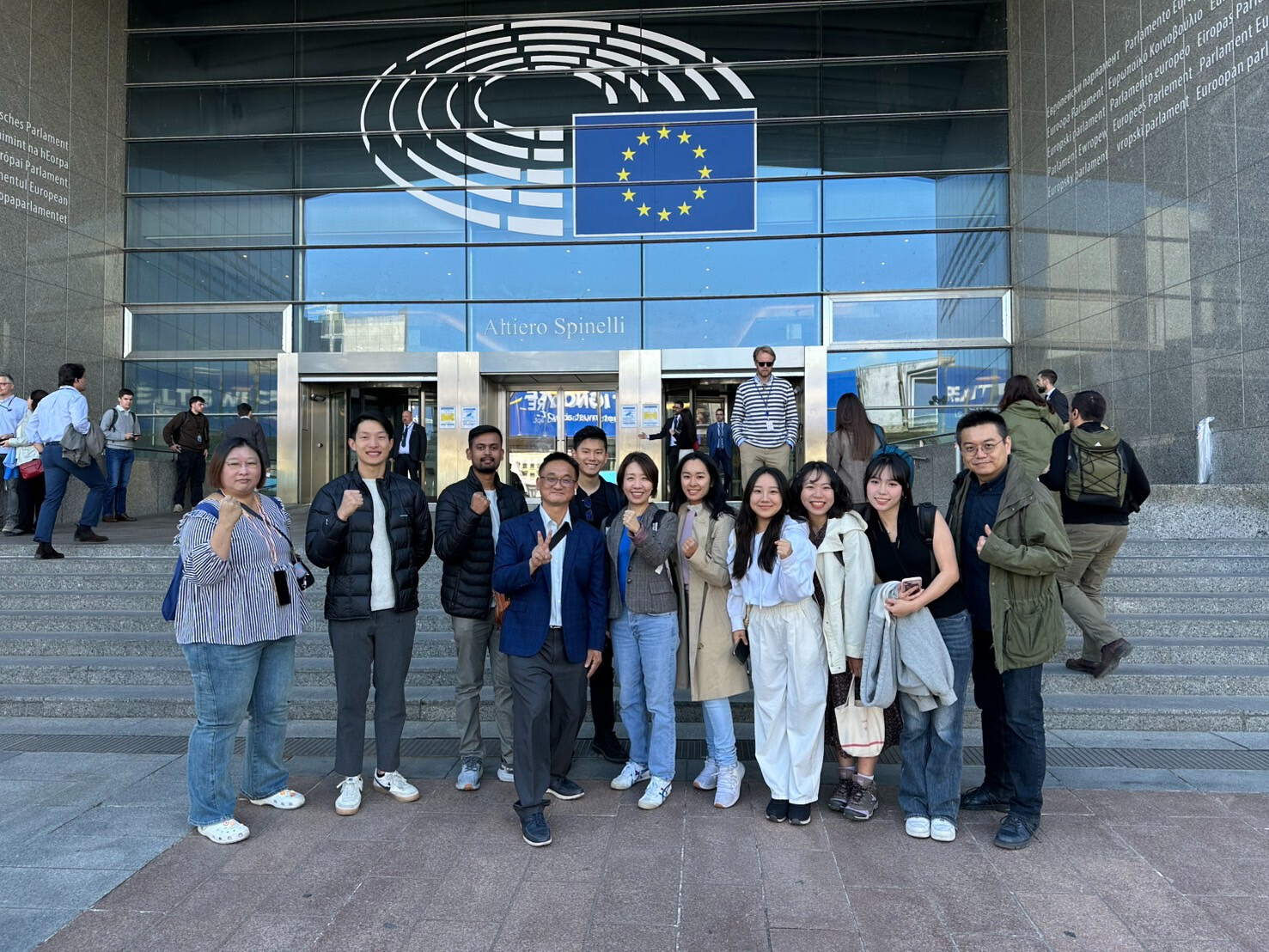


2025 WHO青年代表們

2025年5月,我以青年代表及媒體組成員的身份,參與「台灣聯合國協進會WHO宣達團」前往歐洲的國際倡議行動。這不僅是一次跨國行程,更是一次深刻的公民實踐。短短一週,我親身經歷了台灣如何以「非正式」的身分,在聯合國體系邊陲,持續尋求發聲的可能。而這個「發聲」的行為,本身即是一種政治、策略與外交軟實力展現。
從理論層面來看,發聲(voice)在全球治理的語境中,往往與能見度(visibility)、正當性(legitimacy)以及代表性(representation)相互交織。台灣因地緣政治因素長期被排除在聯合國體系之外,但健康與疾病沒有國界,公共衛生的挑戰也不該被地緣政治所劃分。因此,「在國際組織之外持續發聲」成為我們抵抗邊緣化的重要手段。本次宣達行動,正是以「公民社會」的力量補足「主權國家」的缺席,嘗試在制度之外,創造一個台灣可以被看見、被理解的發聲空間。
在媒體組的角色中,我負責撰寫新聞稿、組織影像與文字敘事,這些工作看似是技術性的,其實背後蘊含著語言的選擇權與論述的主導權。舉例來說,我們不只是報導一場展覽的舉行,而是選擇以「健康不應被政治化」作為主軸,用科技創新與人道價值來證明台灣的參與具有實質意義。這種傳播策略,是在國際輿論中試圖重建「台灣」的話語位置(discursive positioning),讓觀者不再只從地緣政治視角看待台灣,而是看見台灣如何實踐全球責任、回應全球需求。
這次在日內瓦舉辦的展覽,聚焦於WHO的三大核心目標(Triple Billion Targets),展現台灣在AI復健、慢性病管理、區塊鏈憑證等領域的實踐成果。對我而言,這場展覽不只是一場科技展示,也是一場政治參與:它不靠正式席位、外交承認,而是用具體的貢獻換取國際社群的注意與尊重。在某種程度上,這也體現了一種「逆權的發聲」(subaltern voice),即在既有結構中處於劣勢者,仍堅持透過非典型手段參與國際公共討論。
此外,遊行當日我們雖因WHO官方活動取消,仍自發舉行「台灣人大遊行」。這讓我反思,行動本身不必仰賴權威的認可,它可以是主體性的實踐。特別是在Place des Nations前的破碎木椅旁,更有人將那把缺腿的椅子比喻為「沒有台灣的聯合國體系」,此類象徵性的發言,雖不具法律效力,卻具有極高的象徵與敘事力量。從文化研究觀點來看,這種「象徵政治」是弱勢者在無法參與制度決策時,用來重塑社會想像與話語空間的有效工具。
作為青年代表,我也開始思考:青年如何參與國際發聲?又該如何避免「被動出席」而走向「主動論述」?我們不能只是現場的觀察者或表面的代表人,而要理解發聲的背景脈絡,掌握訊息的再製與傳播,並對外界提出有深度、可持續的論述。正因如此,我將這次新聞報導不僅視為任務,更視為建構國際傳播敘事的實驗。新聞不是單向宣傳,而是一次次對世界解釋「我們是誰、我們為什麼在這裡」的機會。
總結這次經驗,我深刻體認到:在發聲之前,必須先定位自身立場;而在發聲之後,更要持續行動。發聲不是一次性的事件,而是長期的實踐,甚至是一項跨文化、跨語境的對話藝術。在台灣長期被排除於國際制度之外的現實中,每一位願意站出來說話的人,都是行動者、都是連結者、也是倡議者。我很榮幸能參與這場持續發聲的歷史過程,並將這份經驗轉化為未來行動的動力。

On a crisp December evening in 2024, as Taipei shimmered under the quiet breath of winter, I stood with my teammate Cheska in a hall filled with passionate young minds. We were attending the closing ceremony of the Young Adults Program: Global Voice Project, organized by the Taiwan United Nations Alliance (TAIUNA). This was no ordinary youth event it was a platform that brought together voices, perspectives, and a collective vision for Taiwan’s international future. When our names were called and we were honored with the Outstanding Performance Award, I felt a shift inside me. What had begun as an opportunity to learn about diplomacy quickly transformed into a calling to serve as a bridge between Taiwan’s civil society and the world.
We were soon selected as part of an official eleven-member delegation to represent TAIUNA during the 2025 WHO Assembly Week in Europe. It was an immense responsibility. In the months that followed, our lives were overtaken by preparation researching WHO policy, drafting speeches, curating exhibits, coordinating with civil society leaders, and practicing the art of diplomacy in every form. We were not diplomats by title, but by duty and conviction, we had become exactly that. As a PhD researcher in Artificial Intelligence for Cancer Pathology at Taipei Medical University, I was also given the opportunity to contribute to the curation and coordination of the Taiwan Health Tech Exhibition at Geneva Central Station, a space that would allow us to show Taiwan’s scientific and humanitarian capabilities to the world.
Our journey began on May 13, 2025, when we departed Taipei via Istanbul. Our first stop was Brussels, where we held official meetings with Taiwan’s representative office in Belgium and several European Union representatives. For two days, we participated in advocacy sessions, cultural exchanges, and policy dialogues, sharing Taiwan’s experiences in pandemic control, universal healthcare, and biomedical innovation. Then we continued to Geneva, where from May 16 to May 19, we took part in a series of exhibitions, WHO-adjacent events, and civil society programs centered around Taiwan’s role in global health.
Geneva, with its grand institutions and quiet lakeside boulevards, became a living classroom. Each day presented new lessons in strategy, negotiation, and visibility. At the Taiwan Health Tech Exhibition in the bustling Geneva Central Station, we showcased AI-powered health platforms, blockchain-based health certificates, and privacy-preserving rehabilitation systems. We spoke not only of technology but of values resilience, inclusivity, and the belief that Taiwan, despite being excluded from the WHO, had never turned its back on the world. The crowds who gathered to see our work confirmed what we already knew: Taiwan can help, and Taiwan is already helping.
One of the most profound experiences came during the Taiwan Night Gala at the Hotel President Wilson. The room was alive with lawmakers, ministers, diaspora leaders, and youth like me. Former Vice President Chen Chien-jen himself a distinguished epidemiologist had just returned from Rome to join us. Standing before a room full of Taiwan’s allies and advocates, he declared, “Even when excluded from the WHA, Taiwan donated millions of vaccines. Even without a seat, we’ve always had a voice.” His words struck like a chord. In that moment, I understood the full weight of our mission: we were not just speaking for Taiwan we were embodying its quiet strength.
On May 18, we marched in the Taiwan Parade beneath the towering Broken Chair Monument in front of the United Nations. The energy was electric. Waves of flags fluttered alongside handmade banners. Lawmakers walked beside us. European supporters held signs reading, “Global Health Needs Taiwan.” We chanted, we waved, and we stood united with the elderly activists in green vests who had been coming to Geneva for decades. As we reached the shores of Lake Geneva, its waters shimmering in the afternoon light, I felt the moment crystallize. What had begun as a youth program in Taipei had turned into something far more powerful a lived expression of civil society, democracy, and identity.
Amidst this whirlwind of preparation and participation, one quiet message stood out. Living in Taipei, I had submitted an application for a Schengen visa to support my participation in the WHO Assembly Week. I had written a formal letter explaining my role as a youth delegate, my official invitation from TAIUNA, my contributions to the Geneva exhibition, and my commitment to return to Taiwan after the program. After a few days of anxious waiting, I received a message: “Dear Mr. Tiwari, you can collect your visa tomorrow.” It was a simple sentence, but it held profound weight. That visa was not just a bureaucratic approval it was a confirmation of trust. A recognition that I, a student from India living in Taiwan, had earned the privilege to represent this Tiwan’s voice abroad.
This journey from the hopeful speeches in a Taipei auditorium to the streets of Geneva lined with solidarity has changed me. I’ve come to understand that advocacy isn’t about volume; it’s about vision. It’s about carrying the weight of unheard voices with care, clarity, and courage. It’s about showing up with dignity, even when you’ve been left out of the room. It’s about being part of a long tradition of ordinary citizens who do extraordinary things not for power, but for people.
As I returned to Taipei, filled with memories and a sense of renewed purpose, I knew this was not the end. This was the beginning of a longer path one where borders are not barriers, and youth are not sidelined but central to the future of diplomacy. For those who wonder if their voice matters, let this story be a reminder: it does. And when spoken with integrity, it can move nations.

站在日內瓦三腳椅廣場上,看著手中高舉的標語,耳邊是來自不同國家的支持聲音與熟悉的台語口號,那一刻,我真正體會到:為台灣發聲,不只是立場的展現,更是一場情感、行動與信念的結合。
這次參與 2025 年世界衛生大會期間的台灣 WHO 宣達團,對我來說不只是一次國際倡議的經驗,更是一趟深刻認識自己與國家角色的旅程。我們在瑞士街頭高喊「Taiwan for WHO」,不只是為了表達訴求,也是在全球健康體系中尋找台灣應有的位置。
這段旅程中,我深刻體會到什麼叫做「替他人發聲」的責任與困難。我們在日內瓦車站策展,介紹台灣醫療科技、全民健保制度與遠距照護創新,不少觀展者是對台灣毫無概念的路人。要如何在短時間內說清楚「為什麼台灣值得被納入世界衛生體系」,考驗著我們的語言組織能力、論述邏輯與情緒控制。我也曾遇過一位外國觀眾,提出對台灣主權定位的敏感提問。那一瞬間,我不是一個單純的學生,而是一個代表台灣立場、必須冷靜應對的發聲者。
然而,我也看到身邊夥伴們令人感動的發聲方式。看著ANNA善於和各國友人聊天,以輕鬆但堅定的語氣推廣台灣醫療實力;用視覺創作說故事,用展板與影片傳遞理念,在開幕式上以童聲唱出台灣的溫柔與多元文化。這些發聲方式沒有高分貝的抗議,卻在場域中留下溫柔而堅定的能量。讓我明白,發聲的形式可以很多元,不一定要激烈,卻都一樣有力量。
在大遊行當天,我走在長長的人群裡,喊著口號,看著每一個回應我們微笑、停下腳步詢問的陌生人,我都覺得:這樣的行動,值得。我們不只是說給媒體聽,也是在說給自己聽。台灣不是孤單的,我們有夥伴,有聲音,也有堅持。
最讓我印象深刻的,是晚間僑委會舉辦的台灣之夜晚宴。那裡聚集了來自世界各地的僑胞與行動者,大家分享著自己在不同國家如何用不同方式「讓世界看見台灣」。有人是醫師,用醫療合作為台灣發聲;有人是留學生,在課堂上主動介紹台灣議題;也有人是 NGO 成員,用政策倡議在國際組織內推動改變。我發現,為台灣發聲這件事,並沒有標準姿態,也沒有一種專屬角色,它可以發生在任何一個有意識的人身上。
這趟旅程教會我,發聲不是一場表演,而是內化的責任。它需要準備、勇氣與持續的行動。我學到如何說清楚台灣的價值,也學會如何傾聽別人的故事,再把這些故事變成一種有溫度的連結。
我們的聲音未必立即被所有人聽見,但只要願意說、願意站出來,世界終究會慢慢回應。我相信,在每一個持續發聲的人身上,台灣的光會一直存在。